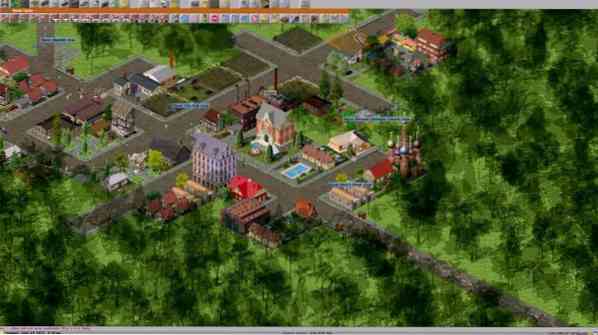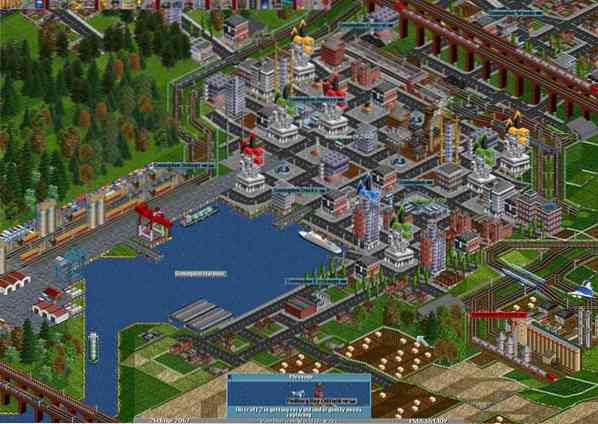Many Linux distros have default firewalls built into the kernel and can be configured to offer excellent defense against network intrusion. For example, Firewalld is the default firewall software for Fedora, Red Hat, CentOS distros, while Debian and Ubuntu ship with the Uncomplicated Firewall.
There are many open-source firewall software to choose from depending on your level of expertise, the size of the infrastructure to protect, convenience of use, or even whether there is a graphical tool for the firewall. This article will highlight Linux firewall tools in no particular order. The best firewall will vary from one user to another, depending on your requirements. Creating a resilient and secure network to prevent data breaches requires a comprehensive set of tools and configurations.
Why Firewall?
A well-configured firewall is your computer's or network's first line of defense against network intrusion and can prevent data loss and breaches. A firewall is a set of rules that regulates the movement of data packets in and out of a protected network. You may want to know in detail what is a Linux Firewall, how it works, and what it does for you in our detailed Linux Firewall article.
Open-Source Firewall tools for your Linux Systems
nftables & iptables
nftables is a successor of iptables and is part of the Netfilter Linux kernel project, enabling firewalling, the network address and port translation, and packet filtering.
iptables
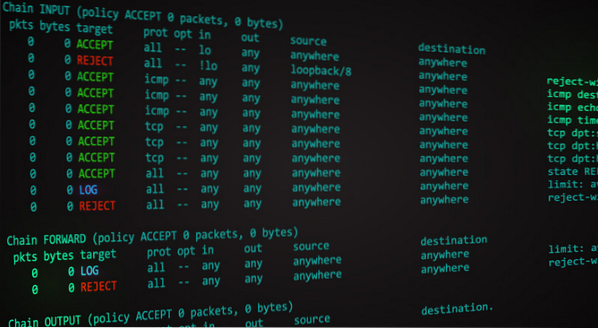
Iptables is a common name in the firewall domain. It is a firewalling software that allows you to define rulesets. It has a terminal-based implementation, and experienced Linux server admins use it because it is effective and customizable. Still, it can also be complex to configure for novice system admins. Data packet filtering tasks take place from the system kernel. The features and attributes of the iptables firewall are as follows:
- It has packet filter rulesets that support content listing.
- Implements a packet header inspection approach, which makes the firewall conveniently fast.
- Editable packet filter rulesets enable a user to add, edit, or remove a firewall configuration rule.
- You can use it for data file backup and restoration tied to the firewall's functionality.
nftables
nftables is the successor of iptables, and it allows more flexibility, scalability, and performance packet classification. nftables is the replacement of iptables since 2014 and is available for system admin through the nft command-line tool. However, iptables aren't going anywhere soon as it is still widely used in iptables-protected networks. Nftables has added new functionality and flexibility to the Netfilter package. Its main features include:
- It offers a network-specific virtual machine through the nft command-line tool.
- System admins can achieve high performance through maps and concatenations.
- It has a smaller kernel codebase with the potential to allow the package to deliver new features through upgrading the userspace command-line tool without necessarily having to upgrade the kernel.
- It has a unified and consistent syntax for every support protocol family.
Firewalld & Uncomplicated firewall
Firewalld and Uncomplicated firewall (UFC) are user-friendly firewall implementations introduced as higher-level Netfilter interpreters. They are designed to solve network security problems faced by stand-alone computers.
Firewalld
Firewalld is part of the systemd family and is the default firewall management tool for RHEL, CentOS, Fedora, SUSE, and OpenSUSE. Firewalld is a dynamically managed firewall with support for network or firewall zones. Zones make it easy for users to define trust levels of network interfaces and connections. It has firewall settings support for IPv4, IPv6, ethernet bridges, and IP sets. Its main features and benefits include:
- It has a complete D-Bus API that makes it simple for applications, services, and users to adapt firewall settings.
- IPv4, IPv6, bridge, and ipset support.
- IPv4 and IPv6 NAT support.
- Support for firewall zones that features predefined zones and services.
- Timed firewall rules offer system admins the flexibility to separate permanent and runtime configurations, making it possible to do network tests and network evaluations in real-time.
- You can configure settings using the firewall-cmd terminal command and through a graphical configuration tool.
Firewalld has a wide availability and can also be installed in other distribution like Debian and Ubuntu. After installation, you have to enable and activate firewalld at boot time for it to be effective.
UFW - Uncomplicated firewall
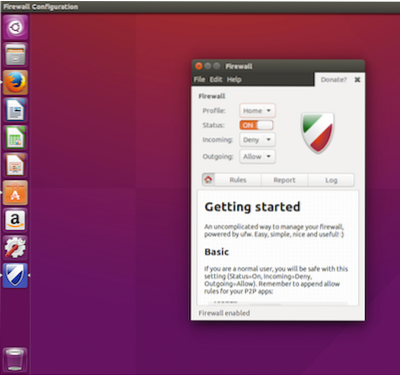
Ubuntu servers ship with the uncomplicated firewall by default. Its design objective was to develop a less complex and user-friendly firewall than the iptables from the Netfilter package. The firewall also packages a GUI called GUFW for Ubuntu and Debian users. We can summarize its features as follows:
- Supports IPV6
- Status monitoring
- It's extensible and can be easily integrated with other applications
- You can add, remove, or modify firewall rules to your preference
- Has an On/Off facility as an extension of its logging options
pfSense
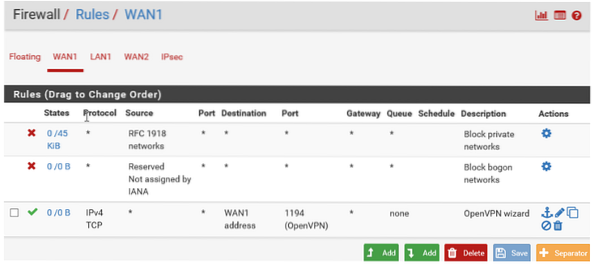
pfSense firewall has a custom kernel based on FreeBSD, and it describes itself as the most trusted open-source firewall. It has been praised for its reliability and commercial-level features. It conceptualizes Stateful Packet filtering. It is available as a hardware device, virtual appliance, and a downloadable binary for the community edition. The premium or commercial version of the firewall comes with a heavy price tag. Its prime features are as follows:
- Load balancing for inbound and outbound traffic
- Provides the server's real-time information and caters for traffic shaping
- Its configuration can make it function as a VPN endpoint and as a wireless access point
- It is deployable as a DHCP & DNS server, a firewall, and as a router
- It has a web-based interface from which it can be upgraded or flexibly configured
- It offers high availability
- You can use it on more than one internet connection.
IPFire
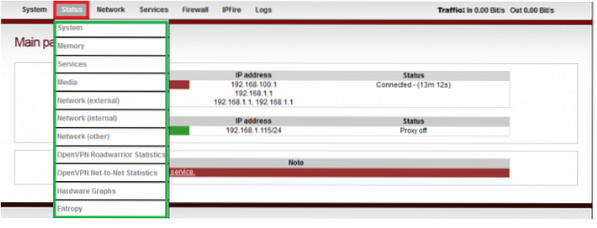
IPFire is an easy-to-use open-source firewall that works best in a Small Office Home Office setting or environment. It is a stateful firewall built on top of Netfilter. It is highly flexible and with a lot of modular considerations in its design. It can be used as a firewall, VPN gateway, or proxy server. It also qualifies as an SPI (Stateful Packet Inspection) firewall. A summary of its features are as follows:
- Content filtering
- Multi-deployment facilitation can be as a VPN gateway, a proxy server, or a firewall.
- It features an inbuilt IDS (intrusion detection system) functionality to detect and prevent attacks from day one.
- Its support extends to Chats, Forums, and Wiki.
- Provides a virtualization environment through its support for hypervisors like Xen, VMWare, and KVM
- It supports a color-coded security configuration which makes it user-friendly.
- You can increase its functionalities through handy add-ons like Guardian, which can implement automatic prevention.
OPNsense
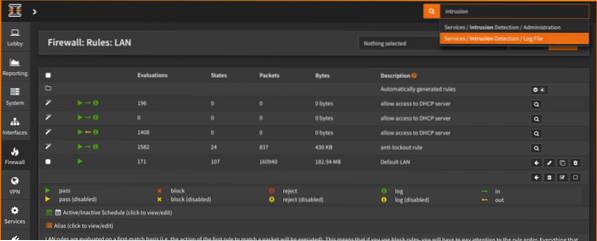
OPNSense is a fork of the pfSense and m0n0wall open source projects. It is powered by HardenedBSD, which is a fork of the security-oriented OS FreeBSD. It can be used as a firewall and routing platform. It has been adopted because of the following;
- It can be used for filtering traffic, shape traffic, and displaying a captive portal.
- It has security and firewall features like IPSec, Netflow, Proxy, VPN, Web filter, etc.
- It uses an inline intrusion prevention system with deep packet inspection to detect and prevent network intrusions.
- It offers weekly security updates.
- It features a web-based interface available in multiple languages like French, Chinese, Russian, etc.
- It is compatible with 32bit and 64bit system architecture.
Endian
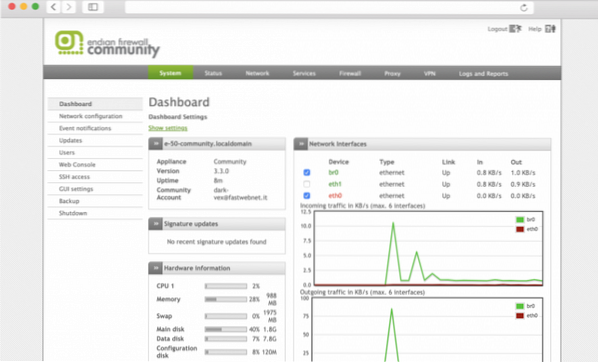
The Endian Firewall Community conceptualizes a stateful firewall for network protection and packet Inspection. It can transform a bare-metal hardware appliance into a powerful security solution comprising a gateway VPN, firewall, antivirus, proxy, and content filtering. Its prime features are as follows:
- VPN support with IPSec
- Real-time network monitoring and logging.
- Bidirectional firewall
- Real-time reporting of network activities and resource usage like bandwidth, etc.
- Provides mail servers security through Spam Auto-Learning, SMTP proxies, Greylisting, and POP3 proxies.
- Provides web server security through URL blacklist, antivirus, HTTP & FTP proxies.
Config Server Security & Firewall (CSF)
Config Server Security & Firewall (CSF) is a versatile cross-platform software. It conceptualizes a stateful firewall, SPI (Stateful Packet Inspection), login detection, and Linux systems security solution. The firewall is supported by numerous hosts like RHEL/CentOS, CloudLinux, Fedora, Debian, Ubuntu, OpenSUSE, Slackware, and virtual environments like VMware, Virtuozzo, XEN, OpenVZ, Virtualbox, and KVM. Its key features include:
- It has a straightforward SPI firewall script
- IPv6 support with ip6tables
- It has an advanced intrusion detection system and can alert you to changes to system and application binaries.
- Can shield a Linux box from the ping of death and syn flood attacks
- Easy to manage and configure
- Can work with a configured email alert system to send notifications on unusual network activities or detected intrusions.
- It features a UI Integration for cPanel, DirectAdmin, CentOS Web Panel, etc.
Shorewall
Shorewall is an open-source firewall and gateway configuration tool for the GNU/Linux environment. The Linux kernel is known for its integration with a Netfilter system. It is from this system that a basis is provided for the development or creation of this firewall. Its features can be summarized as follows:
- Supports VPN
- Supports port forwarding and masquerading
- Supports multiple ISP
- A Webmin Control Panel is part of its GUI interface
- Centralized firewall administration
- Supports numerous gateway, routers, and firewall applications.
- It manages stateful packet filtering through Connection Tracking Facilities provided by Netfilter.
NG Firewall
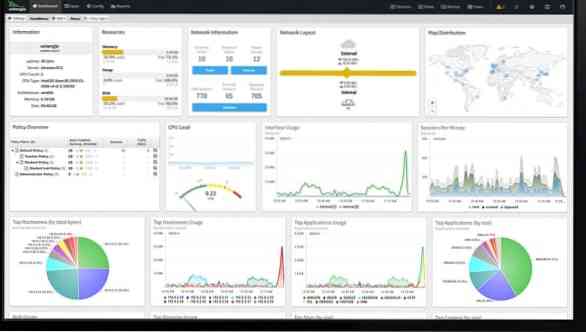
NG Firewall is part of the Untangle platform, which provides solutions to protect your network. The untangle platform works like an app store to enable or disable particular modules based on your requirements. The free version of Untangle comes with the NG Firewall and can be installed on a server, virtual machine, and cloud. You can upgrade Untangle to the paid version to unlock more features. Untangle also provides the software in a stand-alone hardware package that comes with the software package pre-installed.
Recap
A firewall keeps your network secure, healthy, and organized through intrusion protection and the authentication and authorization protocols it puts in place. Before you choose the firewall software to use, you should consider the network infrastructure's size, security layers required, and the number of network devices you want to manage. The firewall tool must be actively maintained with regular security patches and work well for a typical user. Typical users might prefer a system with a web interface or GUI, while an experience Linux user might be comfortable with working with the firewall tools through the command line.
 Phenquestions
Phenquestions


